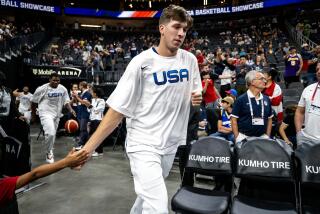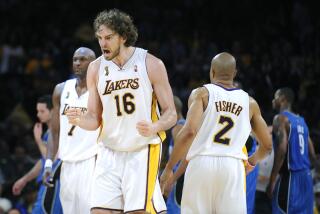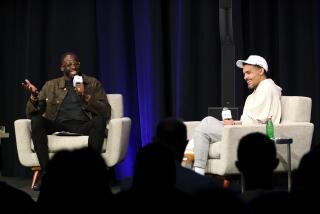Lakers visit National Civil Rights Museum ahead of Martin Luther King Jr. Day
Reporting from MEMPHIS — Lakers rookie Kyle Kuzma wandered away from the group in the first room of the National Civil Rights Museum on Sunday afternoon. He ducked into a corner, standing in front of the reproduced bowels of a slave ship.
Mannequins were hunched over, chained to the floor, in the tightest of spaces, while Kuzma studied the information printed on the wall.
Soon after, he pulled out his cellphone and sent a tweet.
“Why is the beginning of learning black history for most people start with slavery?” he wrote. “Instead of African kings and queens and royalties. I wonder how they teach it the history in Africa.... food for thought.”
More than 50 years before, some of the nation’s top black athletes — Muhammad Ali, Jim Brown, Bill Russell and Kareem Abdul-Jabbar (then known as Lew Alcindor) — gathered for a historic show of unity and social consciousness inside a nondescript Cleveland office building.
The process, now, has been streamlined.
“Think about it,” NBA guard Jamal Crawford said. “When you saw those guys, they were at a press conference. They were actually holding the press conference to talk to the media. Now, through social media, you can hold your own press conference any time you want. It’s at your fingertips, literally.”
Donald Trump’s controversial presidency, police brutality, sexual harassment — it’s all been discussed and argued about on social media and some professional athletes have no problems wading into those pools.
Kuzma, who along with the Lakers will play the Memphis Grizzlies on Monday blocks from the hotel where Dr. Martin Luther King Jr. was assassinated, said he always thought he would use his platform to share his views if given the opportunity.
“I really never thought I would have an opportunity to do that. I always said if I had a platform to speak, I am going to speak. I feel it is just important not only for African American-related things but world things in general,” Kuzma said. “I feel like it is very important for us to do that because for many of us we are the voice of the people; there are people that look up to us that have these certain things to say that they can’t say because they are not somebody [famous]. For us I think it is very important to use our stage.
“… It’s how I want to approach it. I am always a woke person, know about things, always feel a certain type of way.”
Athletes in 2018 don’t have to be “woke.” They don’t have to be political.
J.A. Adande, the director of sports journalism at Northwestern University and a former sports columnist at The Times, said we’ve seen athletes manage to stay apolitical. Dallas Cowboys wide receiver Dez Bryant brushed off questions about fellow NFL players protesting during the national anthem this past season.
But, in a way, Bryant is an outlier.
“It’s not that it’s impossible to avoid [politics],” Adande said. “It’s just that it’s more possible to weigh in.
“…The main thing is we don’t have to wait for athletes to be asked the questions anymore. It used to be we’d really only hear about it when a question was asked, and the question didn’t come up that often. Now, they can jump in on their own.”
NBA players, in particular, play in a league where the biggest stars aren’t afraid to voice their opinions.
LeBron James has evolved into a powerful voice on social issues, from protesting Trayvon Martin’s death in 2012 to wearing shoes with the word “equality” printed on the back during a game in Washington earlier this season.
Lakers rookie Josh Hart said James has set the tone for young players entering the league.
“He wasn’t at first when he was younger, but now he’s a lot more vocal,” Hart said. “He’s the best player in the world and him being that vocal, he’s a role model.”
Inside the Lakers locker room, forward Luol Deng has tried to mentor the team’s younger players, even advising them to be cautious with what they say on social media when it comes to politics or activism.
“I think the older you get, the more you voice your opinion,” Deng said. “For a lot of young guys, I can’t even imagine dealing with the stuff they have to deal with today — just that their opinions are out there on social media. Everything you do, you’ve got to be careful.”
It’s just not Twitter, though.
More reporters are asking players about topics such as politics, territory that’s fair to ask even the league’s youngest players, Adande said.
“That’s the ultimate expression of your political opinion, right — the voting booth. If 18-year-olds can have that right, then 19-year-olds certainly can have their opinions,” he said. “And, it’s fair to ask them of their opinions. It’s also fair to abstain from weighing in if you feel like you don’t know enough.”
Crawford, an 18-year veteran of the NBA, spent most of his career without talking much about politics until the 2016 presidential campaign.
“I think [you need to] be passionate about it, whatever it is that you’re talking about. When you’re passionate about it, you want to know more about it so you do more research on why you feel the way you do,” Crawford said. “Don’t just speak out because it’s the popular thing to do. And, then, you speak from your heart. When you speak from your heart and it’s coming from a good place and you’re passionate and feel strongly, you’ve got to go for it.”
As the players walked through exhibits chronicling the most important moments of the civil rights struggle in the 20th century, the tour guide reminded players that their actions outside of the museum matter. Monday’s game in Memphis, after all, will honor King because of his actions and his words.
It’s a message Deng has tried to impart to the team’s younger players as well.
“A lot of times, it’s not just about voicing your opinion. What do you really stand for? I think a lot of guys who speak out, speak out because they can back it up,” he said. “A lot of people do that because they’re already doing stuff in their community or working on whatever issue they’re voicing out about. A lot of times, guys are afraid to speak because they’re not doing anything about a situation.
“For them, it’s just an opinion.”
Twitter: @DanWoikeSports
More to Read
All things Lakers, all the time.
Get all the Lakers news you need in Dan Woike's weekly newsletter.
You may occasionally receive promotional content from the Los Angeles Times.








